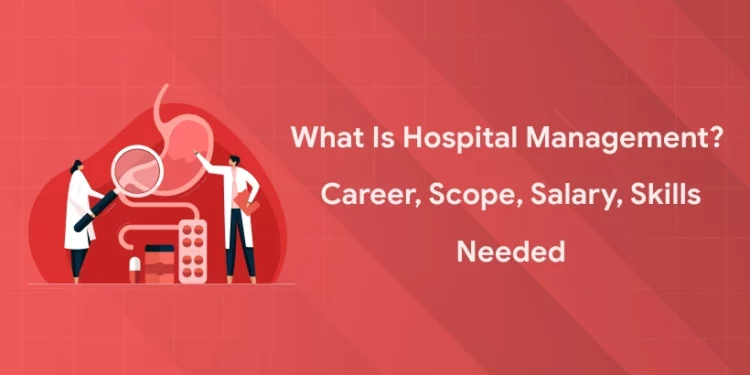Table of Contents
Hospital management plays a vital role in the healthcare sector, keeping healthcare facilities running and providing consistent quality of service. They ensure that hospitals and other healthcare facilities provide the best care to every patient. Healthcare department have different job opportunities for both hospital management graduates. In this article, we describe what hospital management is, the different jobs available in the sector, Career scope and salary available for each posts.
Embark on a journey of professional growth and expertise in healthcare management with the carefully selected hospital management courses in Entri.
What is Hospital Management?
Hospital management is a field involving various healthcare professions at various levels that work together to ensure the smooth running of healthcare facilities. Hospital management professionals are tasked with managing the administrative operations of nursing homes, clinics and hospitals. Their work includes personnel management, administrative planning, accounting, public relations, etc., all with the goal of ensuring that patients receive the best possible care.
Why Pursue a Hospital Management Career in India?
1: What is the primary role of a hospital administrator?
Demand surges due to the need for 2 million new hospital beds by 2026 and post-pandemic digital shifts such as telemedicine. Freshers enter via entry roles; mid-level pros climb fast amid 15-20% annual sector growth.
Key drivers: Aging population, Ayushman Bharat expansion, and private chains like Apollo hiring aggressively. Salaries start at ₹4-6 lakhs, scaling to ₹20 lakhs+ with experience, outpacing many sectors.
Hospital Administration Course with Assured Career Growth
Hospital Administration Course by Entri App: Master essential healthcare management skills, gain certification, and secure top roles in leading hospitals
Join Now!Responsibilities In Hospital Management Job
There are many roles in hospital management, each with a unique set of responsibilities. Some tasks are common to all of these jobs, including:
- Work with multiple departments and act as liaisons between physicians, boards of directors, department heads and other medical staff
- Help various departments work together to achieve the goals of the healthcare facility
- Oversee recruitment, training and policies that ensure quality patient care
- Involvement in budgeting and costing of health services
- Conducting employee evaluations
- Setting policies and guidelines for treatment procedures
- Handling public relations, fundraisers, conventions, and staff meetings.
, Explore Your Future in Hospital Management! Enroll now
Scope of Hospital Management
The demand for hospital and healthcare management is increasing in India, mainly due to increasing medical tourism and India becoming a hub for medical tourism; some patients attend treatment.
In addition, health and hygiene awareness is also increasing; therefore, the demand for hospital and healthcare management is increasing.
As the demand increases, so the scope and opportunities are also increased in this industry. The management department plays a vital role in the healthcare sector as it is the segment where the best services and financial resources are to be managed.
Therefore, the demand for hospital and healthcare management students will increase if the leadership is inappropriate.
A specialized course in hospital and healthcare management offers candidates a broad scope and is essential for finding information and making important decisions in the healthcare industry.
Since the course covers business management in this field, hospitals require such candidates for optimal resource management.
Career Options and Salary for Hospital Management
You can find hospital management positions at different levels of seniority. For example, you can manage a pharmacy as a pharmaceutical manager or oversee the entire operation of a large hospital as a healthcare administrator. Here are some jobs that a qualified healthcare professional can apply for:
1. Hospital Administrator
A hospital administrator, also called a hospital manager, manages all departments of a smaller medical facility or heads a specific department in a larger hospital. In this role, they manage the hiring of employees, oversee training programs, and conduct regular employee evaluations. Hospital administrators also ensure that the facilities they oversee adhere to the latest medical laws and guidelines.
2. Hospital Financial Manager
This is a senior level position available only to people with significant healthcare management experience. Hospital financial managers oversee contracts with medical equipment manufacturers and pharmaceutical companies that supply drugs. They are in charge of managing the hospital. Hospital Financial managers who oversee hospitals understand medical equipment and supplies and the financial management of a company.
3. Medical Director
Primary Responsibilities: These physicians oversee patient care and clinical procedures at the facility. Utilizing administrative and clinical skills, the Medical Director leads staff in best clinical practices to deliver quality care, risk management and other safety initiatives. Most medical director positions require candidates to have a Doctor of Medicine (MD) degree and several years of experience as a clinical practitioner.
4. Medical College Dean
Primary Responsibilities: Deans in medical schools report to senior management. They work in medical faculties and are responsible for administrative management. Common responsibilities include overseeing curriculum development, handling recruitment and human resources functions, assuming responsibility for finance and budget-related decisions, initiating facilities improvement projects, and improving operations at the institutional level. This senior role requires advanced education.
5. Clinical Manager
Primary Responsibilities: Working in outpatient settings such as clinics, the Clinic Manager oversees the day-to-day operations of the clinic. They help hire staff, coordinate patient care plans, and communicate with clinic staff. Clinical managers need excellent organizational, administrative and communication skills.
6. Health Information Manager
Information management is the responsibility of the health information manager. This includes taking care of health data, such as patient records, to maintain their privacy, security and integrity. On a typical day, the Health Information Manager implements systems and guidelines for accurate documentation of medical reports, works with physicians to improve the record keeping process, and works with coding teams to check that the programs used for documentation are working well.

7. Medical Coding Specialist
Hospitals, clinics, and other healthcare facilities use medical coders to encode details of health information for billing. Unlike computer programming, medical coding involves logging details such as diagnoses, procedures, conditions, and prescribed treatments. Healthcare managers with a greater attention to detail are better positioned to fill this role.
8. Research Manager
Primary Responsibilities: When a research facility conducts clinical trials to evaluate new drugs, treatments, and equipment, it needs a research director to oversee the trial. Research supervisors lead teams of research associates, check that the trial is in compliance with government regulations, and verify that each research project achieves the desired outcome.
9. Public Health Program Manager
Government bodies carrying out public health research programs appoint managers to ensure that they achieve the project’s objectives. These program managers are in charge of budgeting and performance evaluation of health professionals working on the project. They also develop project-specific work instructions and policies for everyone involved.
10. Healthcare HR Manager
Healthcare HR professionals know both the healthcare industry and HR practices. The HR take care of employees hiring, training the new employees and analyze the employees performance. People in this role are strong multi tasker and have excellent communication and organizational skills. Healthcare recruiters are familiar with both the healthcare industry and HR practices.
11. Hospital CEO
The general manager is responsible for the smooth operation of the medical facility. They are responsible for everything that happens in the hospital facility. People applying for this role need significant experience in hospital administration and specialist knowledge of the inner workings of various departments. Everyone in a hospital leadership position report directly to the CEO of the hospital.
Join Entri’s Business Administration & Hospital Management Course
Hospital Administration Course with Assured Career Growth
Hospital Administration Course by Entri App: Master essential healthcare management skills, gain certification, and secure top roles in leading hospitals
Join Now!Skills Needed for Hospital Management Jobs
1. Industry Knowledge
The healthcare industry can be extremely competitive, and earning a master’s degree can boost your career. The nation’s most recognized master’s in health administration programs are endorsed by the Commission on Accreditation of Healthcare Management Education (CAHME), the only organization that can officially recognize programs offering a master’s degree in healthcare management. An employer knows that job applicants with a CAHME-accredited Master of Health Administration (MHA) have received a quality education, honed required skills, and built a network of industry contacts, all of which help them excel in hospital administration. As one of the few CAHME-accredited online MHA programs, The University of Scranton’s degree program gives graduates a competitive edge when applying for jobs.
2. Leadership
Hospital administrators are the senior staff of the hospital. They are expected to inspire the organization to deliver the best possible medical care at the big picture level. The day-to-day responsibilities of hospital administration professionals include supervising staff and implementing new policies.
In all their tasks and decisions, hospital administrators must apply the highest ethical standards of leadership organized by the Healthcare Leadership Alliance (HLA) competency models. According to HLA, these competencies clarify an individual’s roles, performance expectations, and development plans and help articulate the behavioral implications of the strategic vision.
Leadership and management skills, as well as the ability to command respect, are required to enact the mission and vision of the organization and ultimately succeed in the role of hospital administration.
3. Critical Thinking
CAHME-accredited MHA programs arm future healthcare leaders with the analytical skills they need to determine their hospital’s best course of action. This job requires professionals with solution-oriented personality traits who can make informed decisions by looking closely at data and predetermined goals.
Critical thinking is one of the qualities the Health Works Collective has identified as essential for hospital administrators, who “should be independent thinkers who can understand the current medical marketplace and bring solutions to help adapt.” Hospital administrators must be able to critically evaluate all angles of a decision and its potential outcomes. They can then analyze the risks and benefits for their specific needs.
5. Ethical Judgment
HLA stated in its Healthcare Leadership Competencies that healthcare administrators must have high standards of judgment as they develop sensitivity to customer needs and focus on measuring and continuously improving the patient care experience. Many hospital decisions fall to the administrator, which means that a strong moral compass is essential in healthcare leadership. The University of Scranton’s Master of Health Administration embeds Jesuit values into the program to ensure graduates are prepared to make ethical decisions in the field.
6. Adaptability
It’s an exciting but challenging time to be in the healthcare industry: The U.S. Census Bureau recently announced that by 2030, all boomers will be at least 65 years old. In addition, the number of older adults is projected to outnumber children under 18 for the first time. in US history by 2034.
Over the years, these generational changes will place greater demands on hospitals. Adaptability is a key skill if hospital administrators are to keep pace with the ever-changing health care landscape—and it will be required of them. Trustees must be willing to challenge the status quo and inappropriate founder changes.
7. Quick Thinking
Due to changes caused by population shifts, especially the growing number of aging Americans, doctors and staff are turning to hospital administrators for decisions. Hospital administrators should be able to make big and small decisions on the fly, but they must also readily take responsibility for the success and failure of those decisions.
Where Can You Find Healthcare Jobs?
Hospital management has applications in everything from large multidisciplinary hospitals to small dispensaries. The following list describes the various institutions where you can find hospital management jobs:
- Hospitals: Super specialty, multi specialty and general hospitals need qualified hospital management professionals. The number of jobs in such an institution depends on its size, nature and workforce.
- Health Clinics and Private Practice: Smaller outpatient clinics and private physician care facilities also need hospital management staff. The number of available positions per device is smaller here.
- Pharmaceutical Companies: Pharmaceutical manufacturing companies hire hospital management professionals. Pharmacy manager positions are available in hospitals.
- Healthcare NGOs are hiring hospital management professionals for positions as project manager and research team leader. Healthcare NGOs are hiring hospital management professionals for project manager and research team leader positions.
Join Entri’s Business Administration & Hospital Management Course
Conclusion
In conclusion, the hospital management salaries in 2026 presents a compelling outlook for healthcare administration professionals. As the industry evolves with technological advances and the changing healthcare landscape, it is critical to stay informed and adapt to these shifts. The dynamic interplay of skills and expertise in hospital management enables individuals to not only grow financially but also make significant contributions to the healthcare sector. Seize the opportunity, keep up with industry trends, and create a fulfilling career in hospital management.
Hospital Administration Course with Assured Career Growth
Hospital Administration Course by Entri App: Master essential healthcare management skills, gain certification, and secure top roles in leading hospitals
Join Now!













